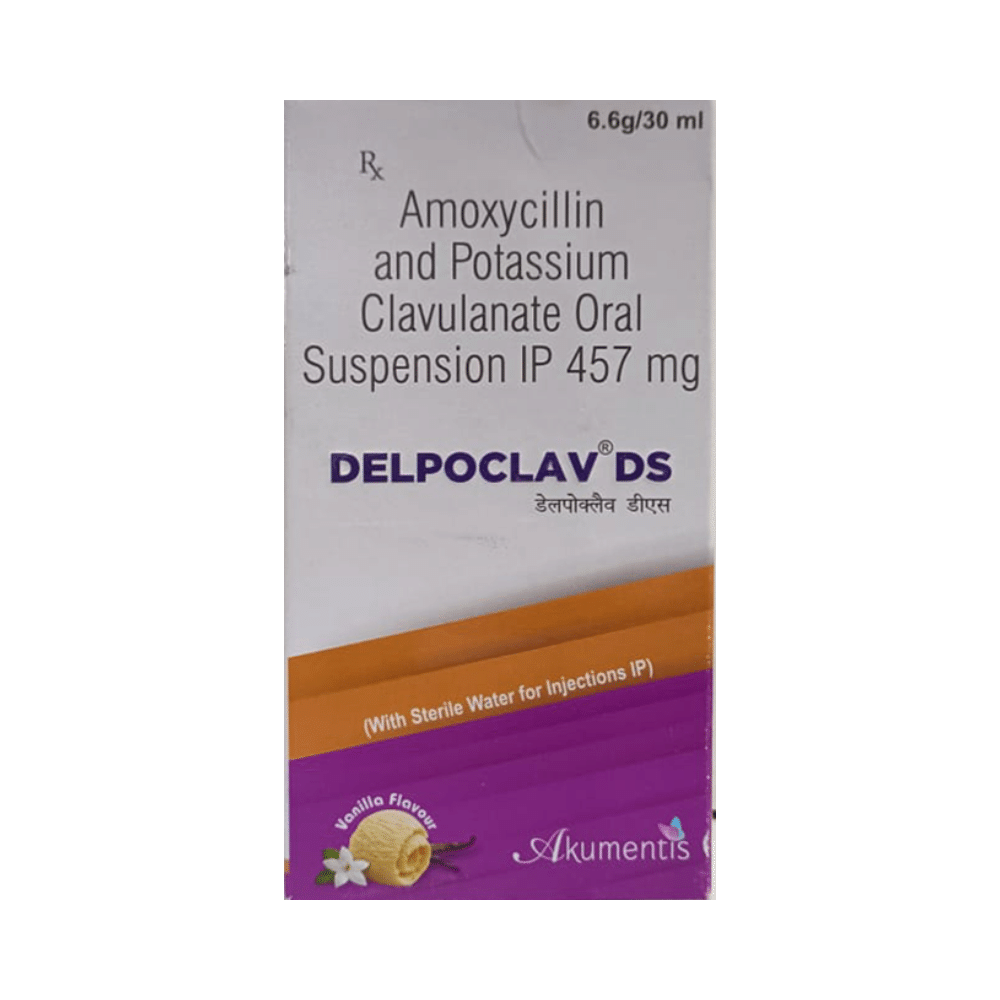
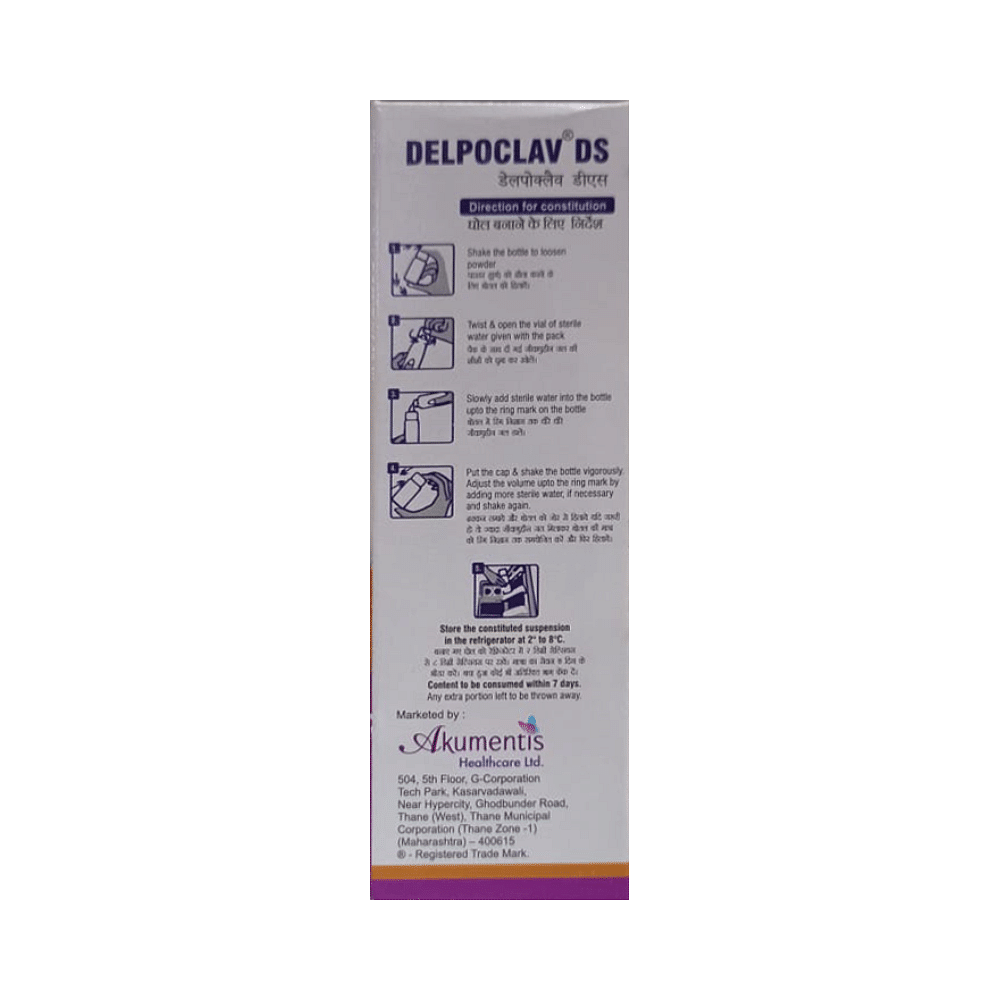
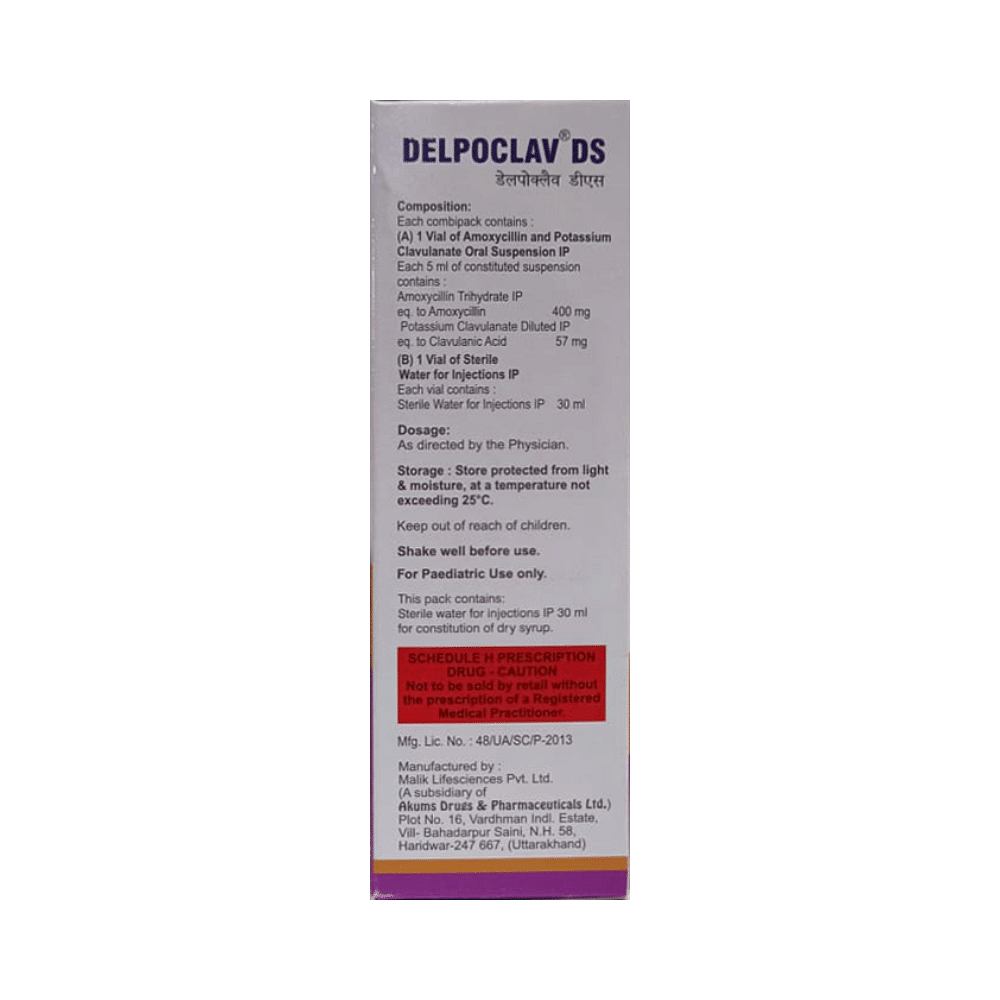
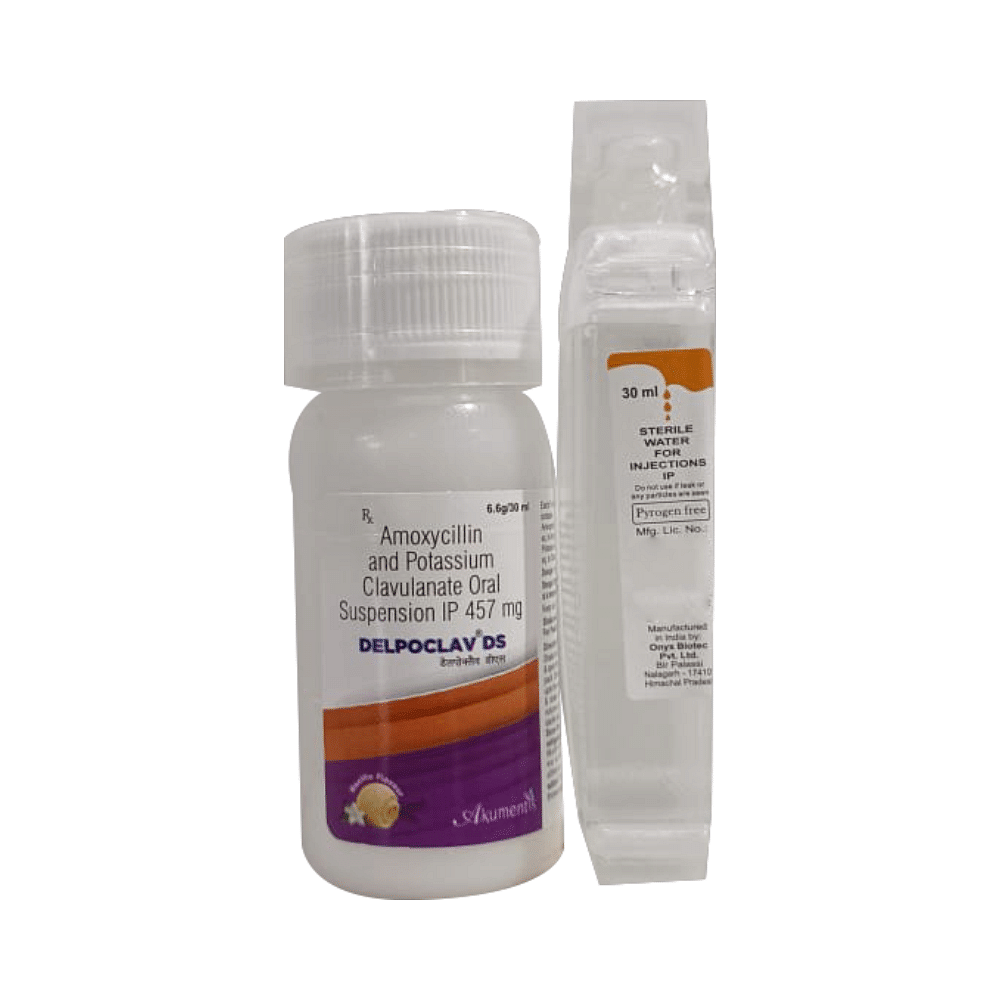
Delpoclav DS Suspension Vanilla
Manufacturer
Delcure Life Sciences
Salt Composition
Amoxycillin (400mg/5ml) + Clavulanic Acid (57mg/5ml)
Key Information
Short Description
Delpoclav DS Suspension Vanilla is an antibiotic medicine that helps treat bacterial infections of the ear, nose, throat, chest, lungs, teeth, skin, and urinary tract.
Dosage Form
Suspension
Introduction
Delpoclav DS Suspension Vanilla is an antibiotic medicine that helps treat bacterial infections of the ear, nose, throat, chest, lungs, teeth, skin, and urinary tract. It is capable of killing bacteria that have become resistant to other therapies and thus also helps treat tuberculosis that is resistant to other treatments.
Directions for Use
Your child must complete the entire course of antibiotics. Stopping too soon may cause the bacteria to multiply again or cause another infection.
Safety Information
Side Effects
No common side effects listed.
How it works
Delpoclav DS Suspension Vanilla is an antibiotic. It has two active agents amoxycillin and clavulanic acid. Amoxycillin works by preventing the formation of the bacterial protective covering (cell wall) essential for the survival of the bacteria. Whereas clavulanic acid serves a special purpose of inhibiting an enzyme (beta-lactamase) that is produced by resistant bacteria. This makes the combination of amoxycillin and clavulanic acid an effective line of treatment for many types of infections.
Quick Tips
Your child must complete the entire course of antibiotics. Stopping too soon may cause the bacteria to multiply again or cause another infection. Your child may have a bitter taste in the mouth after the intake of Delpoclav DS Suspension Vanilla. Eating citrus fruit or sipping plenty of water or fruit juice may help. Encourage your child to drink plenty of water in case diarrhea develops as a side effect. Never give Delpoclav DS Suspension Vanilla until and unless prescribed by the doctor. Do not give Delpoclav DS Suspension Vanilla to treat common cold and flu-like symptoms caused by viruses.
Related Medicines

Addclav Forte Suspension

Rzcv Forte Suspension

Princiclav Suspension

Delpoclav DS Suspension

Zoxil CV 400mg/5ml/57mg/5ml Suspension

Moxclav BD DS 457mg Suspension
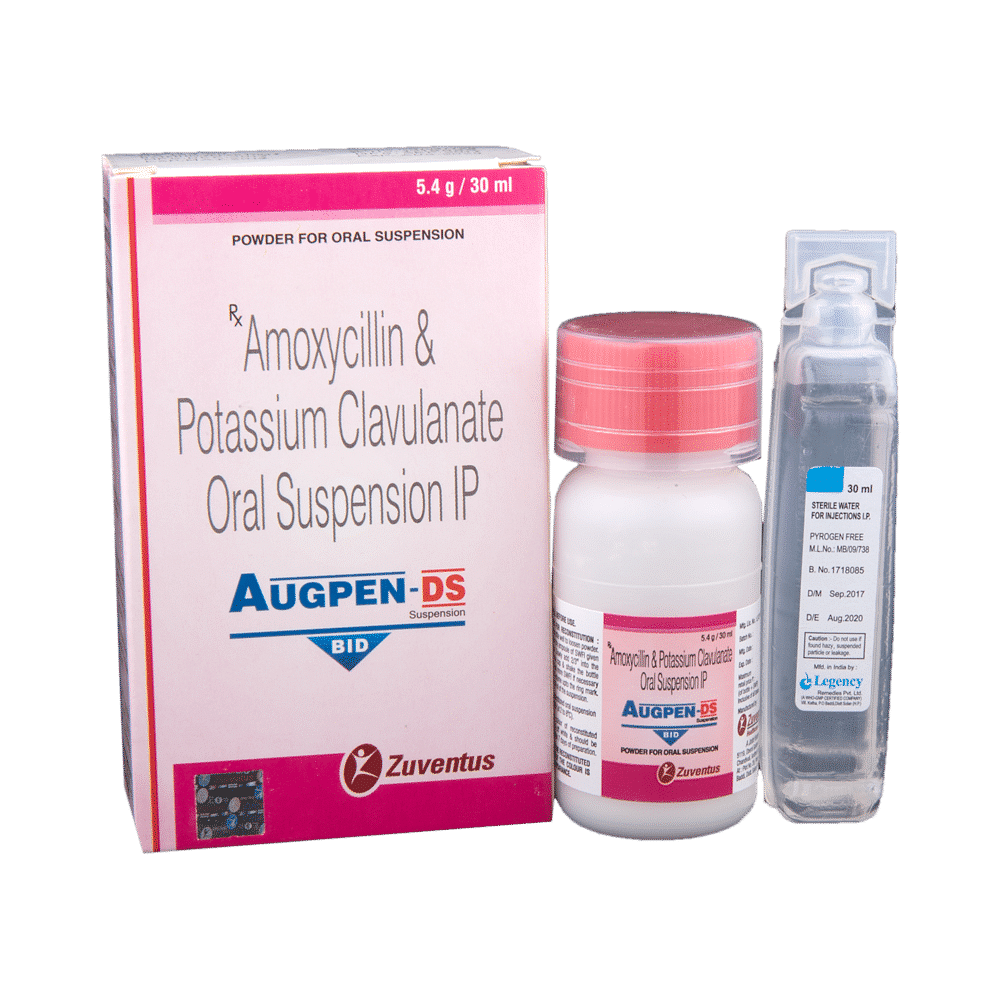
Augpen -DS Suspension
Frequently asked questions
Can other medicines be given at the same time as Delpoclav DS Suspension Vanilla?
Delpoclav DS Suspension Vanilla may interact with other medications or substances. It is important to inform your child's doctor about all the other medications they are taking before starting treatment with Delpoclav DS Suspension Vanilla. Always check with your child’s doctor before administering any medicine to your child.
Can I get my child vaccinated while on treatment with Delpoclav DS Suspension Vanilla?
Antibiotics typically do not interfere with vaccines or cause adverse reactions in children. However, it is generally recommended that children avoid receiving vaccinations until they have recovered from the illness for which Delpoclav DS Suspension Vanilla was prescribed. After your child recovers, their doctor can determine if vaccination is appropriate.
Which lab tests may my child undergo while taking Delpoclav DS Suspension Vanilla on a long-term basis?
Doctors might periodically monitor kidney and liver function tests in children undergoing prolonged treatment with Delpoclav DS Suspension Vanilla to assess their condition.
Can I give a higher than the recommended dose of Delpoclav DS Suspension Vanilla to my child?
Giving a dose higher than the recommended amount can increase risks associated with side effects. If your child experiences symptoms worsening, contact your doctor for further evaluation.
Can I stop giving Delpoclav DS Suspension Vanilla to my child when the symptoms are relieved?
Do not discontinue the medication without a doctor’s guidance until the full course of treatment is completed. Even if your child feels better, Delpoclav DS Suspension Vanilla may still be effective in managing the underlying infection and preventing its recurrence. Consult your doctor before stopping the medicine.
Can the use of Delpoclav DS Suspension Vanilla cause diarrhea?
Yes, Delpoclav DS Suspension Vanilla can cause diarrhea as it is an antibiotic that kills harmful bacteria. It may also affect the beneficial bacteria in your child’s stomach and lead to diarrhea. Encourage your child to drink plenty of water or other fluids if they experience diarrhea. If diarrhea persists, discuss it with your doctor. Do not give any other medication without consulting a healthcare professional.
Do all viral common colds result in secondary bacterial infection?
Most viral common colds do not lead to secondary bacterial infections. While antibiotics are usually unnecessary for viral infections, consult with your child's doctor before administering them if you have any concerns.
The mucus coming out of my child’s nose is yellow-green. Is it a sign of a bacterial infection?
Yellow or green mucus in the nose is not necessarily a sign of a bacterial infection. This color change can be normal during a common cold and often occurs as mucus thickens. Most symptoms will resolve within 7-10 days.
Is there any sign which shows that my child needs immediate medical attention?
Seek immediate medical attention if your child experiences severe allergic reactions (difficulty breathing, skin rashes), gastrointestinal infections (severe diarrhea), or signs of liver damage (weakness, pale appearance, vomiting).


